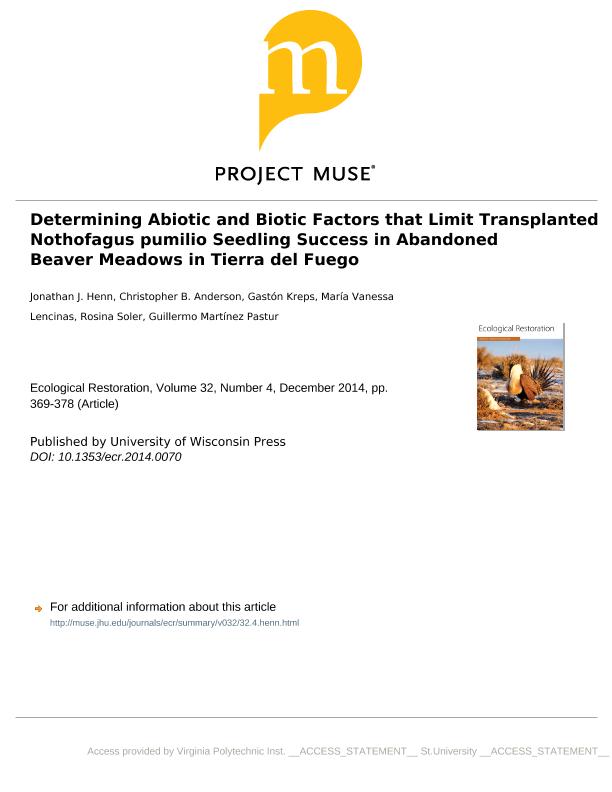Artículo
Determining abiotic and biotic factors that limit transplanted nothofagus pumilio seedling success in abandoned beaver meadows in Tierra del Fuego
Henn, Jonathan J.; Anderson, Christopher Brian ; Kreps, Gaston
; Kreps, Gaston ; Lencinas, María Vanessa
; Lencinas, María Vanessa ; Soler Esteban, Rosina Matilde
; Soler Esteban, Rosina Matilde ; Martínez Pastur, Guillermo José
; Martínez Pastur, Guillermo José
 ; Kreps, Gaston
; Kreps, Gaston ; Lencinas, María Vanessa
; Lencinas, María Vanessa ; Soler Esteban, Rosina Matilde
; Soler Esteban, Rosina Matilde ; Martínez Pastur, Guillermo José
; Martínez Pastur, Guillermo José
Fecha de publicación:
12/2014
Editorial:
University of Wisconsin Press
Revista:
Ecological Restoration
ISSN:
1522-4740
e-ISSN:
1543-4079
Idioma:
Inglés
Tipo de recurso:
Artículo publicado
Clasificación temática:
Resumen
As ecosystem engineers, North American beavers (Castor canadensis) change many environmental conditions in watersheds, felling trees, damming streams, and flooding riparian zones. In Tierra del Fuego, where beavers were introduced in 1946, these alterations have produced meadows that appear to be long-term alternate stable states, lacking signs of resilience and natural forest regeneration. The aim of this work was to determine the abiotic and biotic factors that affect native tree seedling success in abandoned beaver meadows in Nothofagus pumilio forests. Environmental conditions including light, soil moisture, herbaceous plant community composition, and reinvasion potential were measured in areas impacted by beavers and in unimpacted old-growth forests. Additionally, we monitored the survival and success of N. pumilio seedlings transplanted in plots where meadow vegetation was cleared. Tree seedlings showed little growth, and survival varied by type of beaver impact. While survival was high and similar to unimpacted sites in zones cut but not flooded by beavers, it was significantly lower in meadow zones that were previously flooded and cut, compared to old-growth forests. We found that the reinvasion of herbaceous plants into transplantation study plots was negatively related to tree seedling survival, and herbaceous (monocot) plant cover itself was related to beaver-created gradients in soil moisture and light availability. Overall, these abiotic changes modified the meadow's plant community and enhanced herbaceous vegetation cover, particularly monocots and exotics, thus hindering transplanted seedling survival.
Archivos asociados
Licencia
Identificadores
Colecciones
Articulos(CADIC)
Articulos de CENTRO AUSTRAL DE INVESTIGACIONES CIENTIFICAS
Articulos de CENTRO AUSTRAL DE INVESTIGACIONES CIENTIFICAS
Citación
Henn, Jonathan J.; Anderson, Christopher Brian; Kreps, Gaston; Lencinas, María Vanessa; Soler Esteban, Rosina Matilde; et al.; Determining abiotic and biotic factors that limit transplanted nothofagus pumilio seedling success in abandoned beaver meadows in Tierra del Fuego; University of Wisconsin Press; Ecological Restoration; 32; 4; 12-2014; 369-378
Compartir
Altmétricas



